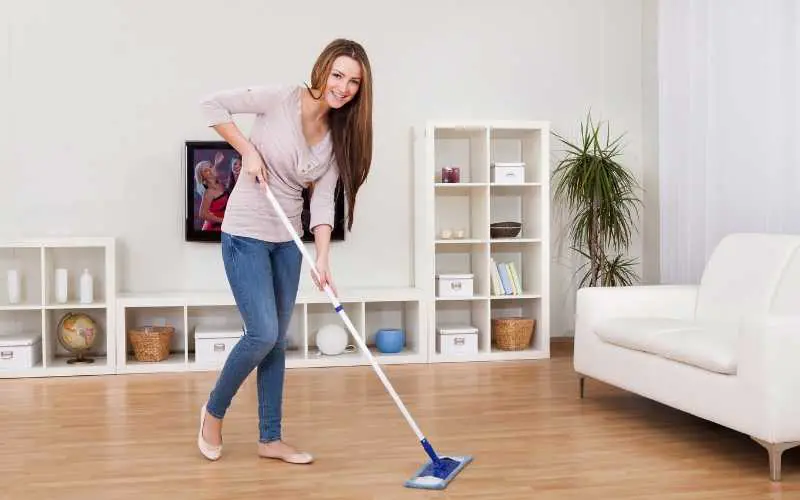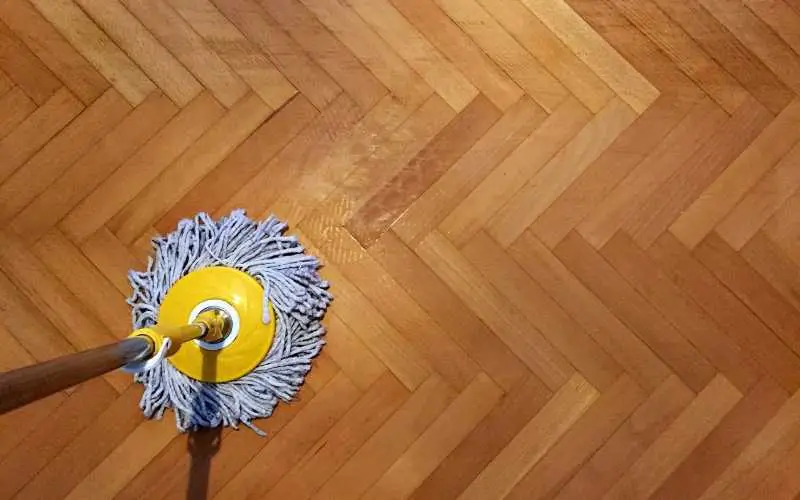Having thoughts on how to give your home a good cleaning, you might as well have your thoughts on if you can put bleach on your hardwood floor.
We know that bleach is a powerful chemical disinfectant used to whiten clothes, eliminate stains, and sanitize toilets, Kitchen floors, sinks, etc. But it’s not an excellent problem solver for every household cleaning layout.
So, can you put bleach on hardwood floors? No, as it breaks down hardwood floors and oozes into the absorptive tissue, breeding dirtiness and making the format of the floorboards look weak.
If you’re planning on giving your floor that clean look, it’s ok for you to ask if you can put bleach on Hardwood Floors.
Read on as we throw more light on this.
Related: Can you Mop Wood Floors With Bleach
Can You Put Bleach on Hardwood Floors?
Table of Contents
- 1 Can You Put Bleach on Hardwood Floors?
- 2 What happens when bleach is used to clean hardwood?
- 3 What Type of Bleach is Safe to Use When Cleaning Hardwood Floors
- 4 Disadvantages of Using Bleach on Hardwood Floors
- 5 Is Bleach Safe on Any Hardwood Floor?
- 6 When Can You Use Bleach on a Hardwood Floor?
- 7 Cleaning Solutions to Avoid
- 8 How to Wipe Deep Stains Without Using Bleach
- 9 Conclusion
No, as you should know that bleach is bad for your hardwood. It breaks down hardwood floors and oozes into the absorptive tissue, breeding dirtiness and making the format of the floorboards look weak.
When you consider the amount of protected and productive methods available, there is no reason to use bleach and endanger your hardwood floors.
Beneath a convincing situation, a heavily diluted bleach solution could be the escape route you can get to cleaning your hard floor.
We will take you on why using bleach to clean your hardwood should never be considered and so many more for you to know and learn.
What happens when bleach is used to clean hardwood?
Considering that wood is a tissue material without an everlasting finish, liquid substances like bleach can get into many layers and go into those layers deeply.
Bleaches, chemicals, and acidic substances can easily break down wood and leave it exposed.
Lastly, these are a few more reasons why you should not bleach your hardwood floors:
- It changes the colors of your floors.
- It weakens your wood.
- It can allow water to penetrate.
- Cause damages that would need professional help and cost you much
What Type of Bleach is Safe to Use When Cleaning Hardwood Floors
No type of bleach is safe to use when cleaning hardwood floors, as it has been continually discussed.
Therefore, we won’t recommend any as bleach generally destroys wood and leaves it exposed.
Disadvantages of Using Bleach on Hardwood Floors
Here are the major disadvantages:
1. Discoloration
The functional element in bleach is sodium hypochlorite, an extremely destructive and active substance.
It kills bacteria, fungi, and viruses and can also change the color of your hardwood floors.
If bleach comes in contact with any color, it changes it molecularly. It changes the numbers of those molecules and how they emulate light. When it’s used on a hardwood floor, you run the risk of your floor changing colors.
2. Wood weakening
Cells found in the wood are clutched simultaneously by lignans, tissue plant-based compounds.
Everyone knows that bleach can break the bonds, and when wood bonds are broken, it risks the structural integrity of your floors or stairs.
Cracked floors can occur, especially when bleach is used on a hardwood floor, particularly over time.
For this cause, bleach should not be used on wooden stairs, chairs, or outdoor decks because it could cause dangerous conditions.
Is Bleach Safe on Any Hardwood Floor?
There are various types of hardwood floors, and each has its features in terms of beauty, natural color, and strength. The durability of the wood comes to play too.
More durable and harder woods like hickory are hard for bleach to penetrate and break down. But, before making use of it on any hardwood floor, ask yourself if it’s worth it.
The universal consensus is not to use bleach when cleaning any hardwood floor. But, the reaction between bleach and wood may vary depending on the kind of wood in contention.
Read: How to Remove Bleach Stain on Laminate Flooring
When Can You Use Bleach on a Hardwood Floor?
Although we don’t recommend it, there are a few situations where one-time use or infrequent bleach applications might be permissible, but keep in mind that it still risks altering the look and integrity of your hardwood floors. Here are some things you should put into consideration before risking it.
Type of Surface finishes
Some surface finishes like polyurethane can withstand the corrosive nature of bleach better than some penetrating finish like linseed oil.
Penetrating finishes sink deep into the wood tissues, while a surface finish relaxes on the top of the wood to stop the absorption of liquids.
Since caustic agents like bleach can still enter into a surface finish, it effortlessly infiltrates penetrating finishes.
The Age of the Wood Floor
Wood floors that are older break down faster than newly made floors. Over time, wood generally settles and starts showing signs of wear.
Apart from that, finishes must be reapplied periodically, so if your floor has been left unattended too, it may be more exposed to damage from bleach.
Bleach Concentration
The capacity of the bleach matters. Only use bleach when it is diluted well with water.
The standard recommendation from the Centers for Disease Control (CDC) is five tablespoons of bleach per gallon of water as a dilution ratio for disinfection.
Spot wiping
When wiping a small area, use a diluted bleach solution and check it first to see how the bleach will respond to your wood floors.
Cleaning Solutions to Avoid
While cleaning your hardwood floors, you should avoid the following cleaning solutions.
- Avoid using cleaning solutions made for tile floors on your hardwood floors.
- Lemon juice or white vinegar as cleaning agents should be avoided if you desire to make your cleaning solutions.
These products are acidic and not designed to clean tissue surfaces like wood. Like the reducing agents in tile floor cleaners.
The acids from the lemon juice or vinegar can break down the finish on your floor and allow water to enter and destroy the wood, causing it to warp, expand, or cup (the same way bleach might).
How to Wipe Deep Stains Without Using Bleach
You may be able to wipe a surface stain off if you address the problem faster with one of the alternatives to bleach outlined in this piece.
But, when dealing with deeper stains that have penetrated layers, you will need to do a thorough cleaning.
Below are tried-and-true steps on removing common stains from your hardwood floors without bleach.
Scuff Marks
Rub a tennis ball or a pencil eraser firmly across the scuff marks.
Grease and Oil
Mix water and mild dish soap, then use the solution to scrub the grease and oil stains in a constant circular motion.
Pet Stains
Make a solution of one part white vinegar and four parts water, then dampen a cloth and scrub the area.
Also, sprinkle some baking soda to get rid of the odor, wait 10 minutes, and clean up the baking soda with a damp cloth.
Wax
You should utilize a hairdryer to loosen the wax softly. After that, clean off the wax with a neat microfiber cloth.
In cases where the stain has had time to set in and has pierced the layers of wood, you would have to strip, sand, and reseal the wood.
Paint
Buff the paint with a microfiber cloth that is damp. Soak the cloth in rubbing alcohol if that doesn’t work and repeat the process.
Water Stains
Put a cloth on the water stain and rub a pre-heated cloth iron on it for a few minutes (with the steam visibly setting off).
Sticky Residue
Place a Mr. Clean Magic Eraser sponge in a 4-part water 1 part vinegar solution and clean out the residue afterward.
Chewing Gum
Place some ice cubes in a nylon bag to harden the gum, then gently chip the cold gum off with a plastic knife.
Read: How to Bleach Wood Floors
Conclusion
Bleach is a corrosive agent that can destroy hardwood floors, especially when used frequently, and the nature of its chemical makeup breaks elements like wood down and changes its color.
We wrote this article about if you can put bleach on hardwood floors to help give you guidance when faced with making a choice about using bleach on hardwood floors.
We hope you found it helpful and informative. If you did, please share it across your entire social media pages

